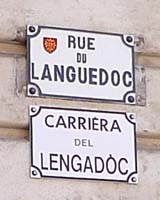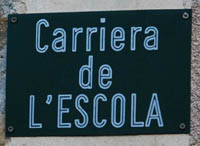
![]() Historically,
Occitan was spoken over a huge area - larger than the traditional
French speaking area. It had a number of dialects,
including Provençal.
Occitan is also closely related to the Catalan
language. Like "unofficial" languages elsewhere
in Europe, the use of Occitan was actively discouraged for
centuries in France, even suppressed.
In the interests of imposing an official language to help
bolster a nascent national identity. You may
still hear people refer to Occitan as a "patois"
a derogatory term for a unofficial language or dialect.
This term became common during the period of the French
Revolution - the result of a nasty little project led by
Abbé Grégoire for the elimination of "patois"
in France.
Historically,
Occitan was spoken over a huge area - larger than the traditional
French speaking area. It had a number of dialects,
including Provençal.
Occitan is also closely related to the Catalan
language. Like "unofficial" languages elsewhere
in Europe, the use of Occitan was actively discouraged for
centuries in France, even suppressed.
In the interests of imposing an official language to help
bolster a nascent national identity. You may
still hear people refer to Occitan as a "patois"
a derogatory term for a unofficial language or dialect.
This term became common during the period of the French
Revolution - the result of a nasty little project led by
Abbé Grégoire for the elimination of "patois"
in France.
To avoid confusion between the present Languedoc (part of the Languedoc-Roussillon Region) and the Languedoc (the area of the langue d'oc where Occitan was traditionally the first language), the latter area is often called Occitania.

![]()

![]() It
is easy now to underestimate the vitality and spread of
the language. It was for example the first (and
preferred) language of Richard I of England (the Lionheart),
as well as of his mother Eleanor
of Aquitaine. Occitan was the first literary
language of modern Europe, the language of the Troubadours.
The Occitan legacy of the Troubadours constitutes one of
the greatest literary treasures of Europe. To
appreciate the beauty of the language and the surprisingly
modern tone of their poetry, you might like to read a short
Troubadour
song, written by a Troubairitz
(a woman troubadour) over eight hundred years ago.
It
is easy now to underestimate the vitality and spread of
the language. It was for example the first (and
preferred) language of Richard I of England (the Lionheart),
as well as of his mother Eleanor
of Aquitaine. Occitan was the first literary
language of modern Europe, the language of the Troubadours.
The Occitan legacy of the Troubadours constitutes one of
the greatest literary treasures of Europe. To
appreciate the beauty of the language and the surprisingly
modern tone of their poetry, you might like to read a short
Troubadour
song, written by a Troubairitz
(a woman troubadour) over eight hundred years ago.
Eleanor's grandfather William IX of Aquitaine was the first known Troubadours. Click on the following link for songs (in Occitan with English translations) by William IX of Aquitaine ![]()
Despite efforts by the French state to suppress Occitan, it still survives. Indeed, it has undergone a revival in the last few years, so you can learn a little about Occitan today.
See the menu at the bottom of this page for the Origins of Occitan, Occitan and Latin, Occitan and French, Occitan and Provençal, Occitan and Catalan, some Word Comparisons, Occitan Sayings, and the Suppression of Occitan.
|
The Church |
Road of the School |
The Square |
 |
 |
 |
The present Languedoc
represents the southern half of the area covered by
the ancient Roman's first province outside Italy. The northern
part is now called Provence,
and it's language, a dialect of Occitan, is known as Provençal.
For more on Provence and Provençal click on the following
link which will open a new window to Beyond
the French Riviera www.beyond.fr ![]()







